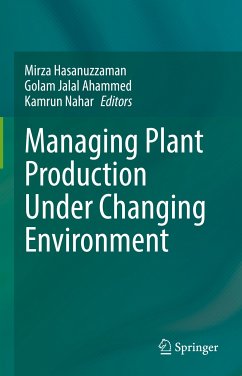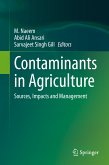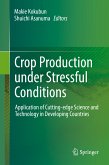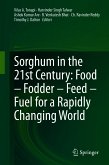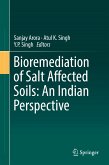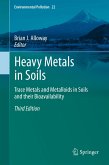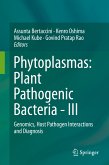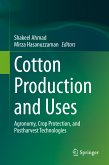Managing Plant Production Under Changing Environment (eBook, PDF)
Redaktion: Hasanuzzaman, Mirza; Nahar, Kamrun; Ahammed, Golam Jalal


Alle Infos zum eBook verschenken

Managing Plant Production Under Changing Environment (eBook, PDF)
Redaktion: Hasanuzzaman, Mirza; Nahar, Kamrun; Ahammed, Golam Jalal
- Format: PDF
- Merkliste
- Auf die Merkliste
- Bewerten Bewerten
- Teilen
- Produkt teilen
- Produkterinnerung
- Produkterinnerung

Hier können Sie sich einloggen

Bitte loggen Sie sich zunächst in Ihr Kundenkonto ein oder registrieren Sie sich bei bücher.de, um das eBook-Abo tolino select nutzen zu können.
This comprehensive edited volume collects the most recent information with up-to-date citations, on the decrease in plant productivity under climatic changes and its link with global food security. The book emphasis on the crop management practices and recent advancement in the techniques for mitigating the negative effects of climate induced biotic and abiotic stress. It brings together 19 chapters developed by eminent researchers in the area of plant and environmental sciences. Global climate change is increasingly becoming a concern for future of agriculture. High levels of inorganic and…mehr
- Geräte: PC
- ohne Kopierschutz
- eBook Hilfe
- Größe: 8.57MB
![Contaminants in Agriculture (eBook, PDF) Contaminants in Agriculture (eBook, PDF)]() Contaminants in Agriculture (eBook, PDF)113,95 €
Contaminants in Agriculture (eBook, PDF)113,95 €![Crop Production under Stressful Conditions (eBook, PDF) Crop Production under Stressful Conditions (eBook, PDF)]() Crop Production under Stressful Conditions (eBook, PDF)73,95 €
Crop Production under Stressful Conditions (eBook, PDF)73,95 €![Sorghum in the 21st Century: Food - Fodder - Feed - Fuel for a Rapidly Changing World (eBook, PDF) Sorghum in the 21st Century: Food - Fodder - Feed - Fuel for a Rapidly Changing World (eBook, PDF)]() Sorghum in the 21st Century: Food - Fodder - Feed - Fuel for a Rapidly Changing World (eBook, PDF)137,95 €
Sorghum in the 21st Century: Food - Fodder - Feed - Fuel for a Rapidly Changing World (eBook, PDF)137,95 €![Bioremediation of Salt Affected Soils: An Indian Perspective (eBook, PDF) Bioremediation of Salt Affected Soils: An Indian Perspective (eBook, PDF)]() Bioremediation of Salt Affected Soils: An Indian Perspective (eBook, PDF)73,95 €
Bioremediation of Salt Affected Soils: An Indian Perspective (eBook, PDF)73,95 €![Heavy Metals in Soils (eBook, PDF) Heavy Metals in Soils (eBook, PDF)]() Heavy Metals in Soils (eBook, PDF)274,95 €
Heavy Metals in Soils (eBook, PDF)274,95 €![Phytoplasmas: Plant Pathogenic Bacteria - III (eBook, PDF) Phytoplasmas: Plant Pathogenic Bacteria - III (eBook, PDF)]() Phytoplasmas: Plant Pathogenic Bacteria - III (eBook, PDF)137,95 €
Phytoplasmas: Plant Pathogenic Bacteria - III (eBook, PDF)137,95 €![Cotton Production and Uses (eBook, PDF) Cotton Production and Uses (eBook, PDF)]() Cotton Production and Uses (eBook, PDF)137,95 €
Cotton Production and Uses (eBook, PDF)137,95 €-
-
-
The book is resourceful reading material for researchers, faculty members, graduate and post graduate students of plant science, agriculture, agronomy, soil science, botany, Molecular biology and environmental science.
Dieser Download kann aus rechtlichen Gründen nur mit Rechnungsadresse in A, B, BG, CY, CZ, D, DK, EW, E, FIN, F, GR, HR, H, IRL, I, LT, L, LR, M, NL, PL, P, R, S, SLO, SK ausgeliefert werden.
- Produktdetails
- Verlag: Springer Nature Singapore
- Seitenzahl: 477
- Erscheinungstermin: 22. Februar 2022
- Englisch
- ISBN-13: 9789811650598
- Artikelnr.: 63495525
- Verlag: Springer Nature Singapore
- Seitenzahl: 477
- Erscheinungstermin: 22. Februar 2022
- Englisch
- ISBN-13: 9789811650598
- Artikelnr.: 63495525
- Herstellerkennzeichnung Die Herstellerinformationen sind derzeit nicht verfügbar.
Chapter 1. Nanoremediation: An innovative approach for environmental safety.- Chapter 2. Sustainable agriculture and plant production by virtue of biochar in the era of climate change.- Chapter 3. Soil management vis-à-vis carbon sequestration in relation to land use cover/change in terrestrial ecosystem-a review.- Chapter 4. Salt-induced toxicity and anti-oxidantal response in Oryza sativa: An updated review.- Chapter 5. Soybean plants under waterlogging stress: Responses and adaptation mechanisms.- Chapter 6. Niger (Guizotia abyssinica (L. f.) Cass.) an oilseed crop under biotic stress.- Chapter 7. Role of phytohormones in antioxidant metabolism in plants under salinity and water stress.- Chapter 8. Plant phenolic compounds for abiotic stress tolerance.- Chapter 9. Efficacy of various amendments for the phyto-management of heavy metal contaminated sites and sustainable agriculture. A review.- Chapter 10. Exploring Plant Responses to Salinity and Implications of Halophytes as a Model for Salinity Improvement.- Chapter 11. Efficacy of Spinach (Spinacia oleracea) for the phyto-management of different heavy metals contaminated sites under chelating agent amendments. A review.- Chapter 12. Insights into Potential Roles of Plants as Natural Radioprotectants and Amelioration of Radiations Induced Harmful Impacts on Human Health.- Chapter 13. Development of rangeland conservation and sustainable management practices under changing climate.- Chapter 14. Biological Nitrogen Fixation: An Analysis of Intoxicating Tribulations from Pesticides for Sustainable Legume Production.- Chapter 15. Sustainable urban forestry, merits, demerits and mitigation of climate change at global scale.- Chapter 16. Temperate Forage Legumes Production, Weeds Dynamics and Soil C: N Economy under Organic Wastes.- Chapter 17. Atmospheric chemistry of aerosols and their role in global climate change.- Chapter 18. Increase in food scarcity, agriculture challenges and their management: Pakistan Perspectives. Chapter 19. Increase ability of transgenic plant expressing the bacterial enzyme to accumulate heavy metals.
Chapter 1. Nanoremediation: An innovative approach for environmental safety.- Chapter 2. Sustainable agriculture and plant production by virtue of biochar in the era of climate change.- Chapter 3. Soil management vis-à-vis carbon sequestration in relation to land use cover/change in terrestrial ecosystem-a review.- Chapter 4. Salt-induced toxicity and anti-oxidantal response in Oryza sativa: An updated review.- Chapter 5. Soybean plants under waterlogging stress: Responses and adaptation mechanisms.- Chapter 6. Niger (Guizotia abyssinica (L. f.) Cass.) an oilseed crop under biotic stress.- Chapter 7. Role of phytohormones in antioxidant metabolism in plants under salinity and water stress.- Chapter 8. Plant phenolic compounds for abiotic stress tolerance.- Chapter 9. Efficacy of various amendments for the phyto-management of heavy metal contaminated sites and sustainable agriculture. A review.- Chapter 10. Exploring Plant Responses to Salinity and Implications of Halophytes as a Model for Salinity Improvement.- Chapter 11. Efficacy of Spinach (Spinacia oleracea) for the phyto-management of different heavy metals contaminated sites under chelating agent amendments. A review.- Chapter 12. Insights into Potential Roles of Plants as Natural Radioprotectants and Amelioration of Radiations Induced Harmful Impacts on Human Health.- Chapter 13. Development of rangeland conservation and sustainable management practices under changing climate.- Chapter 14. Biological Nitrogen Fixation: An Analysis of Intoxicating Tribulations from Pesticides for Sustainable Legume Production.- Chapter 15. Sustainable urban forestry, merits, demerits and mitigation of climate change at global scale.- Chapter 16. Temperate Forage Legumes Production, Weeds Dynamics and Soil C: N Economy under Organic Wastes.- Chapter 17. Atmospheric chemistry of aerosols and their role in global climate change.- Chapter 18. Increase in food scarcity, agriculture challenges and their management: Pakistan Perspectives. Chapter 19. Increase ability of transgenic plant expressing the bacterial enzyme to accumulate heavy metals.
